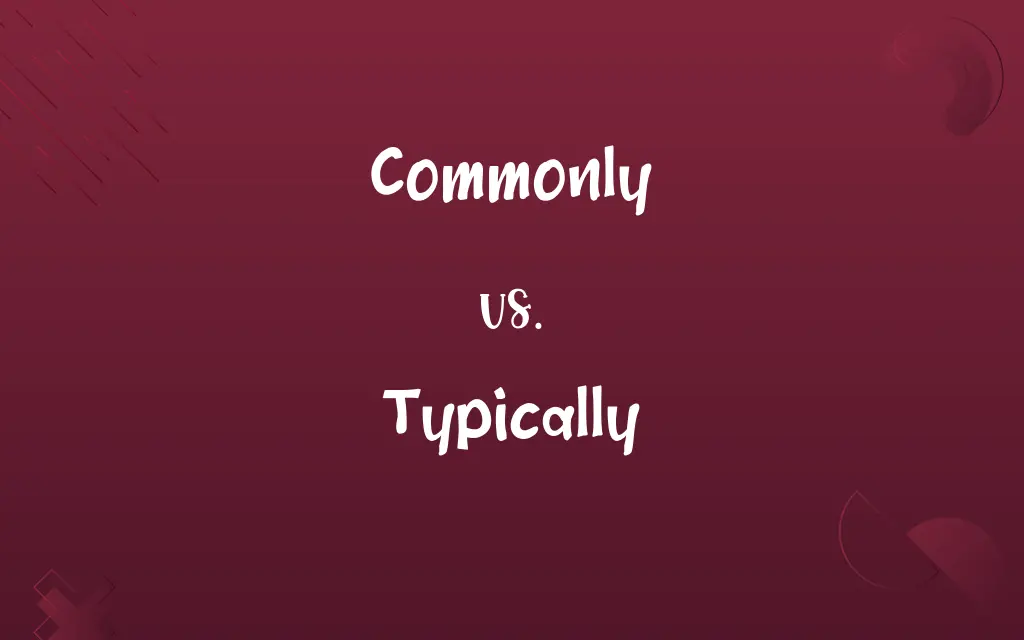Commonly vs. Typically: Know the Difference

By Shumaila Saeed || Updated on December 25, 2023
Commonly refers to what is done frequently or by many, while typically denotes what is usual or standard in most cases.

Key Differences
Commonly indicates something that is done by a large number of people or occurs frequently. It suggests widespread acceptance or practice. In contrast, typically refers to what is considered normal or standard, based on average or usual occurrences. It implies a standard or expected pattern.
Shumaila Saeed
Dec 13, 2023
When describing actions or behaviors, commonly is used to denote what is regularly seen or practiced among a group. This term does not necessarily imply that it is the most ideal or preferred way, just that it is frequent. Typically, however, suggests the most usual or standard way of doing something, often based on a norm or an established pattern.
Shumaila Saeed
Dec 13, 2023
In describing trends or habits, commonly is used to highlight what is often observed across a wide range. It does not signify exclusivity or uniqueness but rather a general prevalence. On the other hand, typically is used to express what is expected based on common patterns or the majority of cases, suggesting predictability.
Shumaila Saeed
Dec 13, 2023
Commonly is about frequency and widespread occurrence. For example, smartphones are commonly used for communication. Typically, however, implies a normative or expected scenario, like people typically using smartphones for social media.
Shumaila Saeed
Dec 13, 2023
In cultural contexts, commonly reflects practices or beliefs widely held within a group, without implying these are the only or predominant ways. Typically in such contexts denotes what is standard or characteristic for a culture, suggesting a more narrowed-down expectation or norm.
Shumaila Saeed
Dec 13, 2023
ADVERTISEMENT
Comparison Chart
Frequency
Indicates widespread or frequent occurrence.
Implies a usual or standard occurrence.
Shumaila Saeed
Dec 13, 2023
Expectation
Does not imply an ideal or preferred way.
Suggests a normative or expected scenario.
Shumaila Saeed
Dec 13, 2023
Scope
Broad, encompassing a general prevalence.
Narrower, focusing on standard patterns.
Shumaila Saeed
Dec 13, 2023
Predictability
More about general trends, less about predictability.
More predictable based on established norms.
Shumaila Saeed
Dec 13, 2023
Cultural Context
Reflects widely held practices or beliefs.
Indicates standard or characteristic practices.
Shumaila Saeed
Dec 13, 2023
ADVERTISEMENT
Commonly and Typically Definitions
Commonly
Often observed or encountered.
Smartphones are commonly seen in public places.
Shumaila Saeed
Dec 05, 2023
Typically
Following an average or common pattern.
Teenagers typically enjoy social media.
Shumaila Saeed
Dec 05, 2023
Commonly
Used in a wide range of situations.
Please and thank you are commonly used expressions of politeness.
Shumaila Saeed
Dec 05, 2023
Commonly
Belonging equally to or shared equally by two or more; joint
Common interests.
Shumaila Saeed
Dec 05, 2023
ADVERTISEMENT
Typically
What is normally expected.
It typically rains a lot in the tropics.
Shumaila Saeed
Dec 05, 2023
Commonly
Of or relating to the community as a whole; public
For the common good.
Shumaila Saeed
Dec 05, 2023
Typically
A defining or usual feature.
Snow is typically associated with winter.
Shumaila Saeed
Dec 05, 2023
Commonly
Widespread; prevalent
Gas stations became common as the use of cars grew.
Shumaila Saeed
Dec 05, 2023
Commonly
Occurring frequently or habitually; usual
It is common for movies to last 90 minutes or more.
Shumaila Saeed
Dec 05, 2023
Typically
Exhibiting the qualities, traits, or characteristics that identify a kind, class, group, or category
A typical suburban community.
Shumaila Saeed
Dec 05, 2023
Typically
Of or relating to a representative specimen; characteristic or distinctive.
Shumaila Saeed
Dec 05, 2023
Commonly
Not distinguished by superior or noteworthy characteristics; average
The common spectator.
Shumaila Saeed
Dec 05, 2023
Typically
Also typ·ic (-ĭk) Of the nature of, constituting, or serving as a type; emblematic.
Shumaila Saeed
Dec 05, 2023
Typically
Conforming with what usually happens
The bus is late again? That's so typical!.
Shumaila Saeed
Dec 05, 2023
Commonly
Unrefined or coarse in manner; vulgar
Behavior that branded him as common.
Shumaila Saeed
Dec 05, 2023
Commonly
Representing one or all of the members of a class; not designating a unique entity.
Shumaila Saeed
Dec 05, 2023
Commonly
A tract of land, usually in a centrally located spot, belonging to or used by a community as a whole
A band concert on the village common.
Shumaila Saeed
Dec 05, 2023
Commonly
The legal right of a person to use the lands or waters of another, as for fishing.
Shumaila Saeed
Dec 05, 2023
Commonly
Commons(used with a sing. verb) A building or hall for dining, typically at a university or college.
Shumaila Saeed
Dec 05, 2023
Commonly
(Ecclesiastical) A service used for a particular class of festivals.
Shumaila Saeed
Dec 05, 2023
Commonly
Usually; generally; ordinarily; frequently; for the most part; as, confirmed habits commonly continue through life.
Shumaila Saeed
Dec 05, 2023
Commonly
Occurring often or widely.
Commonly used words in English include 'the' and 'is.'
Shumaila Saeed
Dec 05, 2023
Commonly
Accepted by many people.
It is commonly accepted that the Earth orbits the Sun.
Shumaila Saeed
Dec 05, 2023
Commonly
A practice done by a large group.
Drinking coffee in the morning is commonly practiced.
Shumaila Saeed
Dec 05, 2023
Repeatedly Asked Queries
What does typically mean?
Typically means what is usual, standard, or expected in most cases.
Shumaila Saeed
Dec 13, 2023
Is commonly the same as universally?
No, commonly means widespread but not necessarily universal.
Shumaila Saeed
Dec 13, 2023
What does commonly mean?
Commonly refers to what is frequently done or found among many people.
Shumaila Saeed
Dec 13, 2023
Can typically imply a stereotype?
Sometimes, as it denotes what is generally expected or seen as normal.
Shumaila Saeed
Dec 13, 2023
How does commonly relate to culture?
It reflects practices or beliefs that are widespread within a culture.
Shumaila Saeed
Dec 13, 2023
Can something be commonly used but not typically?
Yes, something can be commonly used in certain contexts but not typically used in a standard sense.
Shumaila Saeed
Dec 13, 2023
Is typically about frequency?
Typically is more about the usual pattern or standard rather than just frequency.
Shumaila Saeed
Dec 13, 2023
Can typically be subjective?
It can be, as it's based on what is perceived as usual or standard.
Shumaila Saeed
Dec 13, 2023
Can something be typically done but not commonly?
Yes, something might be the typical way to do it, but not necessarily done by many.
Shumaila Saeed
Dec 13, 2023
Does commonly suggest a norm?
Not necessarily; it suggests frequency rather than a normative standard.
Shumaila Saeed
Dec 13, 2023
Does typically always indicate the majority?
Typically indicates what is usual or standard, which often aligns with the majority.
Shumaila Saeed
Dec 13, 2023
Does commonly imply popularity?
It can, as it denotes widespread use or acceptance.
Shumaila Saeed
Dec 13, 2023
Is commonly used in statistical contexts?
Commonly is less about precise statistics and more about general frequency.
Shumaila Saeed
Dec 13, 2023
Can commonly be used to describe trends?
Yes, it's suitable for describing general or widespread trends.
Shumaila Saeed
Dec 13, 2023
Does typically refer to habits?
It can, especially when indicating usual or standard habits.
Shumaila Saeed
Dec 13, 2023
How does typically relate to exceptions?
Typically acknowledges a general rule, while also allowing for exceptions.
Shumaila Saeed
Dec 13, 2023
Is typically used in scientific contexts?
Yes, to describe what is generally observed or expected under normal conditions.
Shumaila Saeed
Dec 13, 2023
Can a behavior be commonly observed but not typical?
Yes, a behavior might be common in some groups but not the typical standard.
Shumaila Saeed
Dec 13, 2023
Can commonly evolve into typically?
Yes, as practices become more widespread, they might become the typical standard.
Shumaila Saeed
Dec 13, 2023
Is typically used for predictions?
Yes, it's often used to indicate what is likely or expected to happen based on norms.
Shumaila Saeed
Dec 13, 2023
Share this page
Link for your blog / website
HTML
Link to share via messenger
About Author
Written by
Shumaila SaeedShumaila Saeed, an expert content creator with 6 years of experience, specializes in distilling complex topics into easily digestible comparisons, shining a light on the nuances that both inform and educate readers with clarity and accuracy.









































































